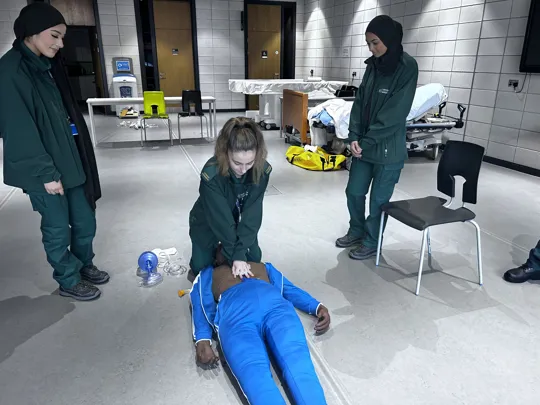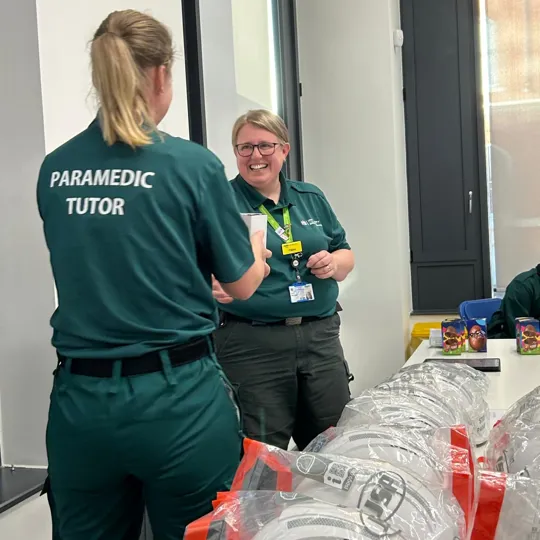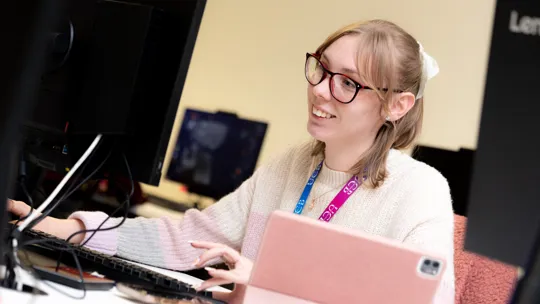January 2025
New paramedic science course students embark on first front-line placement
By Sean Madden
Share post:Read time: approx 6 mins
Students from the Department of Health’s new Paramedic Science BSc course ventured out on placement for the first time this week.
The 12-week block sees students working on the front lines with West Midlands Ambulance Service University NHS Foundation Trust (WMAS), attending emergency calls and gaining hands-on experience of patient care.
After a demanding first semester encompassing both theoretical and practical work, students were equipped with the competencies needed to match the rigorous demands of their first experience out on the road: “The first three months of the course are very intense,” said Claire McCullagh, Course Lead for the Paramedic Science BSc course.
“West Midlands Ambulance Service have very high expectations of the trainees so they need to be quickly up-to-speed across a variety of skills, from basic life support to manual handling.”
Claire spent several years working as a paramedic before switching to higher education. After three years at Staffordshire University, she was excited to take on the challenge of building the new course at University College Birmingham. With a specification that took 18 months to bring together, she is already seeing the value of the work with the first cohort of students: “The group is really small; there are only 20 students so it means they and the staff all get to know each other really well,” she said. "
We formed a tight-knit bond early on, and our open-door policy means students know they can always come and speak to us if they need to. We are a paramedic community.”
The nature of the work means that placement students will very soon work in demanding situations, dealing with real-life emergencies. For this reason, they have access to University College Birmingham’s student support services, and have benefitted from visits organised by the School from organisations such as Mind and The Ambulance Staff Charity (TASC), in addition to support from WMAS themselves.
“Building resilience, people skills, and empathy are crucial for this job. Getting out onto placement early on gives students a feel for what it’s really like out there, and what they can expect to deal with on a daily basis. Between the University and WMAS we want to make sure they have all the support they need to deal with those demands,” Claire emphasised.
The placement is the first of three that students will undertake throughout the year, with the next two blocks of three weeks reflecting the range of professional opportunities they may not ordinarily associate with the role of a paramedic.
Over the three-year duration of their course they can expect to go on placement in such varied locations as care homes, paediatric settings, and GP and Urgent Treatment Centres, and Claire feels that exploring the full range of potential workplaces will allow the cohort to better assess which path is for them:
“It’s important for students to recognise that paramedics now undertake a variety of different healthcare roles in line with evolving service provision, including primary care settings and hospital work. University College Birmingham’s location and experienced staff leave us well-placed to make that happen,” she said.
“As paramedics, we have the chance to make a difference in all kinds of different settings, from mental health, to forensics, to research. We always say: not all paramedics wear green.”
On their return from placement, the students will benefit from training in a real, ex-service ambulance – called Nina – acquired by the University and containing all the tools and equipment a paramedic will need when they’re out on the road.
It is also hoped that moving forward, Paramedic Science students will be able to support students from other healthcare courses in areas such as Basic Life Support and manual handling, helping early on to foster good relationships across the Department and within the multidisciplinary team.


At the end of their degree, students will spend two years on the Newly Qualified Paramedic (NQP) programme, earning as a Band 5 staff member in the NHS. Once this is completed, they will advance to Band 6 and be able to apply to a master’s degree course.
For the moment, Claire is focused on the University’s first paramedic science group and the brilliant work they’ve been doing with WMAS: “I’m so proud of the feedback received already – we’ve had great responses from colleagues, letters from patients.
“One student, on their first morning of placement, was part of a team that attended a cardiac arrest and managed to achieve a Return of Spontaneous Circulation (or ROSC). As is common in these situations, the team received a personal thank you from the CEO of the Trust,” she said.
“The experience they gain on placement will of course help them get a feel for the role but also contribute to building their Practice Assessment Document (PAD) and adding to their portfolio.
“The opportunities gained through the University’s connections and their hard work will help give them the best possible start to their careers.”
Learn about our range of courses across the department of health
Discover more about Not All Paramedics Wear Green
Check out our latest news stories

Former RACA chef apprentice wows Alpine resort guests alongside MasterChef winner
A former Royal Academy of Culinary Arts (RACA) apprentice worked with MasterChef winner and ex-student Dan Le…
Read more
Students help revitalise Great Malvern visitor strategy for the next generation
Six students are working with Malvern Hills District Council to deliver a new tourism and hospitality project.
Read more
Sixth formers explore Singapore's sustainability on trip of lifetime
Twenty sixth formers from University College Birmingham explored Singapore's groundbreaking work in sustainability on an e…
Read more
University in running for top regional sustainability excellence award
University College Birmingham has been shortlisted for a Midlands Sustainability Excellence Award.
Read more
Sun, sights and sustainability for students on Montenegro trip
The trip gave students an insight into sustainable tourism in this up and coming destination.
Read more
Blog | Our 7 top tips for exam preparation
Exams just around the corner? Feeling anxious, or like you’re not sure how to prepare? Don’t worry! Our top tips will help you navigate this stressf…
Read more



